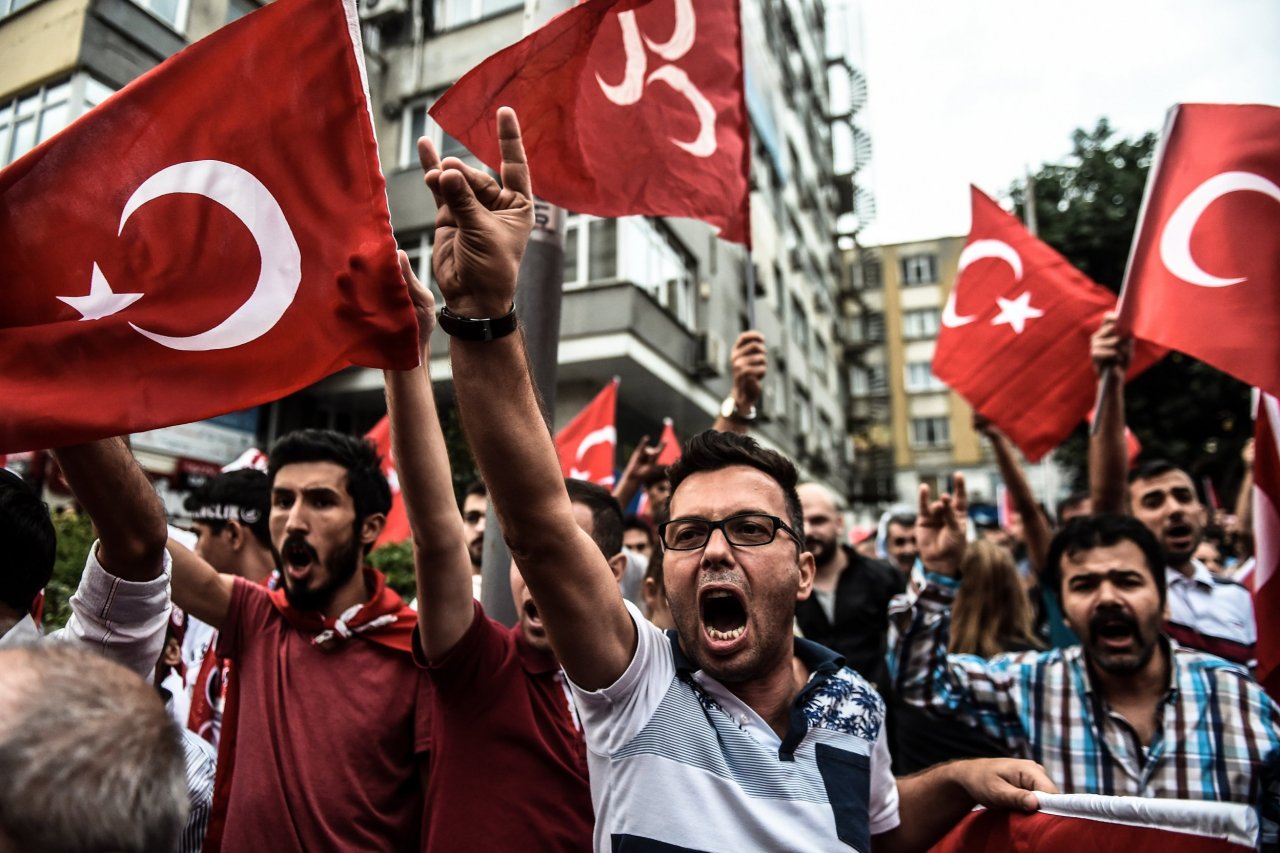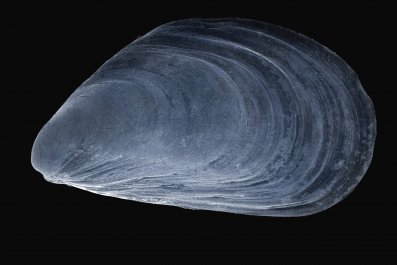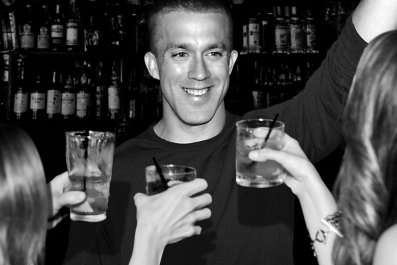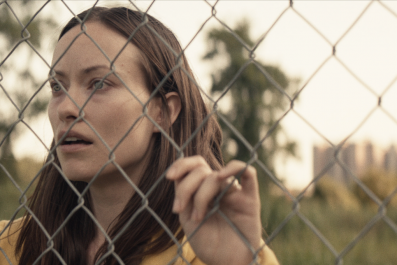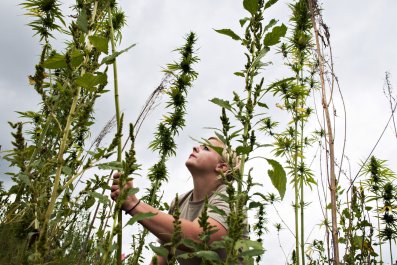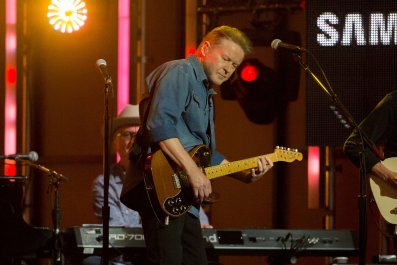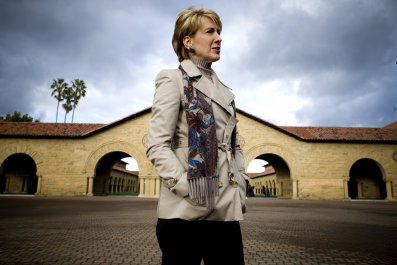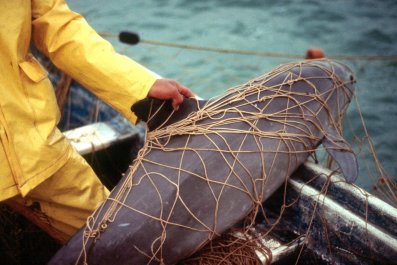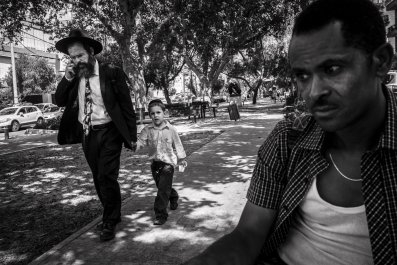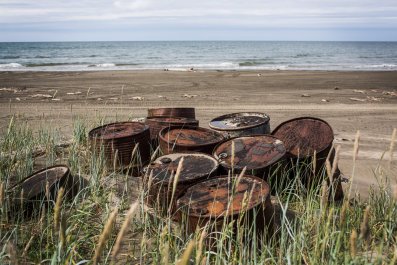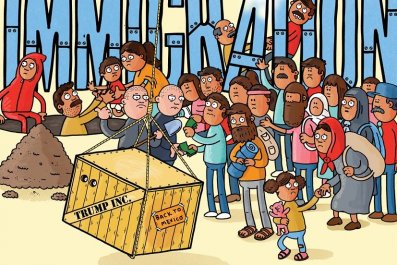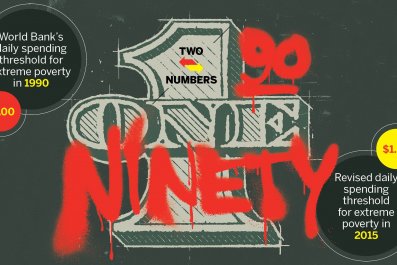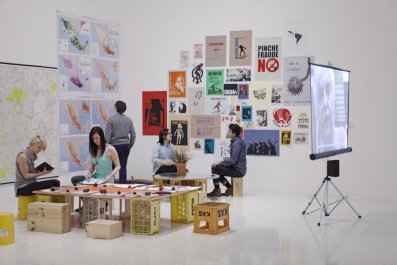Updated Sixteen-year-old Vedat carries a battle-scarred Kalashnikov that looks much older than he is. This week he would be back at high school studying to become a nurse if a spate of shootings and terrorist bombings hadn't erupted over the summer vacation. As it is, Vedat slouches on a street corner by a makeshift barricade made of ancient paving stones. The alley wall behind his little redoubt is riddled with fresh bullet holes and decorated with spray-painted stenciled images of Kurdish separatist heroes and Soviet-style revolutionary red stars. In the street beyond the barricade, middle-aged shopkeepers sweep up glass and shrapnel from storefronts shattered by police bullets in an attack the day before.
"The government does not dare to come anywhere near," says Vedat, who wears a bright pink scarf around his face that matches the color of his shoelaces. He declined to give his last name because, like other Kurdish fighters and their supporters, he did not want the Turkish security forces to know his identity. "We have declared independence here."
This is not a scene from somewhere in Syria but from downtown Diyarbakir, the largest city in southeastern Turkey and the de facto capital of Turkey's 20-million-strong population of ethnic Kurds. In Diyarbakir's historic Suriçi neighborhood, nestled inside the city's black basalt walls that date back a thousand years, up to 50,000 citizens have been living beyond government control behind high barricades since late July. And it's not just Diyarbakir: According to the pro-Kurdish Dicle News Agency (DIHA), the Turkish state has lost control of at least 17 towns across the southeast. In the 10 weeks since the latest round of violence broke out, more than 120 members of Turkey's security forces have been killed, as well as—by the government's account—over 350 Kurdish militants. Last week a bomb at a pro-Kurdish rally in Ankara killed at least 97 in Turkey's worst ever terrorist attack.
For professional guerrillas like Ferman Amed, the hard-eyed, 30-something commander of the rebel forces in the town of Silvan, an hour outside Diyarbakir, the Kurds' war aims are clear. "We will fight until Kurdistan is united," says Amed as he sits in the courtyard of a commandeered house surrounded by armed young fighters. "We will not allow others to decide our future." But for most ordinary Kurds caught up in the latest cycle of war, things are not so clear-cut. "We don't want to be separate from Turks," says Ozgur, a mathematics teacher from Silvan. "We just want to have the same rights as Turks. We want to live normal lives, free of fear."
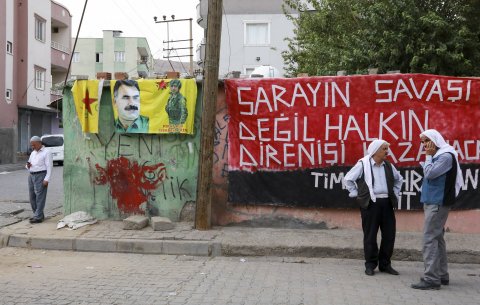
The tragedy of this latest bloodbath is that just a few months ago, it looked as if the Turkish state was on the verge of striking a grand peace deal with the Kurds that would have ended one of the world's longest-running insurgencies. For most of the past 40 years, fighters of the Kurdistan Workers' Party, or PKK, have waged a war against the Turkish state that left over 40,000 people dead. But in recent years, a new, moderate Kurdish political party known as the Peoples' Democratic Party, or HDP, has been urging ordinary Kurds to fight with ballots rather than bullets. And in February 2015, top government ministers sat down to formal negotiations with the HDP around a former sultan's grand dining table in the sumptuous surroundings of Istanbul's Dolmabahçe Palace.
"The message from our leadership was clear: We were ready for peace," says Sibel Yigitalp, an HDP member of parliament for Diyarbakir. The PKK was ready to talk about disarmament. The Turkish government was ready to grant amnesties for low-level rebels, plus a package of investment to rejuvenate the shattered economy of Turkey's southeast. "We trusted the government," says Yigitalp. "Peace was on the table."
Yet now, after a more-than-two-year cease-fire, the bullets are again flying, and swaths of Turkey are in open revolt against Ankara. Even during the height of the bloodshed of the 1990s, the PKK mostly stayed in the hills, avoiding urban warfare. It is hard to overstate how astonishing it is to now see armed rebels openly patrolling the streets of Turkish towns, which are no-go areas not only for Turkish police but for Turkish reporters as well. Most Turkish journalists are deeply distrusted by the rebels. This is Turkey's hidden war — a conflict that erupts into the headlines only when police mount bloody assaults on PKK strongholds like Cizre, as they did in September, but which, for the most part, has gone unreported.
Related: Islamic State is Prime Suspect in Turkey Bombing; Opponents Blame Erdogan
What went wrong? The answer lies in the political ambitions of Turkey's mercurial and increasingly ruthless president, Recep Tayyip Erdogan. When he came to power in 2002, Erdogan cast himself as a friend and champion of Kurdish rights, defying Turkish nationalist critics to push through concessions like Kurdish-language broadcasting and teaching the Kurdish language in schools. Erdogan also pointed to a common victim narrative between the Kurds and political Islamists like himself; both, he said, had been persecuted by the Turkish state.
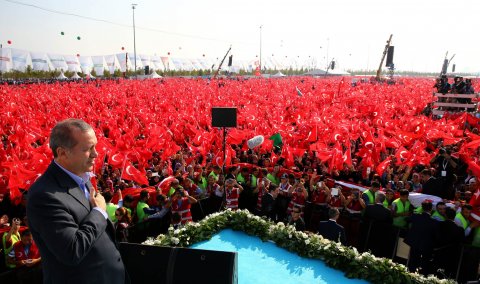
"We went through the same suffering as you. Your brother [Erdogan] was jailed for only reciting a poem," Erdogan told a rally in Diyarbakir in 2011—a reference to when he was imprisoned for nine months for quoting a religious poem at a public rally. "I know how the system made my Kurdish brothers suffer. I know well the policies of forced assimilation. But those days are over."
Unsurprisingly, Kurds flocked to vote for Erdogan's Islamist-leaning AK party—and in that year's general elections, the AKP won 26 out of the 38 seats in the Kurdish-majority provinces. In 2012, the Turkish state even opened negotiations with Abdullah Ocalan, the founder and leader of the PKK who has been languishing on a special prison island in the sea of Marmara since his arrest in 1999. Erdogan called it his "Kurdish opening."
But last year, Syria's civil war—a conflict reshaping many of the region's political structures and relationships—claimed another victim when it derailed the Kurd-Erdogan rapprochement. As Syria's government collapsed, the country's Kurds carved a de facto independent area along the border with Turkey. When the Syrian Kurdish town of Kobane was besieged by Islamic State forces last October Erdogan attempted to close the border to stop Turkish Kurds going to help their ethnic brethren. In the end the Syrian Kurds were able to hold the city after massive airstrikes by the US Air Force—and the Turkish government also relented, providing supplies and allowing some Kurdish fighters from Iraq to travel to Kobane's defence. But against the backdrop of Kobane's obliteration and the flight of more than 200,000 Syrian Kurds to Turkey, trust had eroded between Erdogan and the Kurds. Kurdish voters abandoned Erdogan's AKP and instead began supporting the Kurdish-based HDP and its leader, a charismatic young lawyer named Selahattin Demirtas. By the beginning of this summer, distrust of the Turkish state was so deep that Kurdish politicians like HDP co-leader Figen Yuksekdag were openly accusing Turkish security services of working with ISIS militants to undermine Syria's Kurds. Last Saturday's deadly bomb at a HDP-organized peace rally in Ankara only deepened the rift; Demirtas angrily blamed the government for the attack and denounced the state as "murderers" with "blood on their hands."
Related: Islamists and Secularists Battle Over Turkey's Hagia Sophia Museum
Turkish nationwide elections in June were a triumph for the HDP; it became the first-ever Kurdish party to win seats in the parliament, winning 13 percent of the vote, and Erdogan was deprived of an overall majority for the first time since 2002. Yigitalp, the HDP MP for Diyarbakir, recalls the first day that she and her 80 Kurdish colleagues walked into the parliament in June. "The ultranationalist MPs hated us—they walked all the way round the room in order not to have to look us in the eye," she says. "And the AK party MPs looked at us furiously because we cost them their government majority. I felt like a black person used to feel in America."
For many of Turkey's beleaguered liberals—the kind of secular, pro-European people who came out in the hundreds of thousands to protest against the government in 2013 and occupied and held Istanbul's Gezi Park against the police for weeks—the HDP is Turkey's best hope against continued AKP rule. But overnight, "the government's priority switched from making peace with the Kurds to destroying the HDP," says Ramazan Pekgoz, the editor-in-chief of DIHA. "Erdogan cares more about staying in power than he does about a peace deal. The AKP lost the election, so Erdogan started a war."
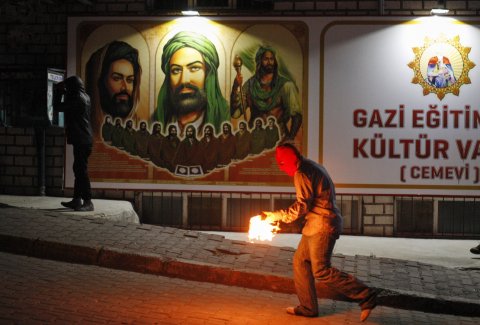
Violence broke out within weeks of the election, with each side blaming the other. The PKK blew up Turkish convoys, killing dozens. "The pain of our security forces who were martyred in the treacherous attack by the separatist terrorist organization sears our hearts," Erdogan told supporters, promising a "decisive" response. Soon after, Turkish security forces launched raids on suspected PKK sympathizers. In July, Turkish military intelligence picked up a movement of PKK fighters and weaponry from mountain hideouts in northern Iraq into Turkish cities. "There has been a power struggle going on for years inside the PKK between the hard men who want to fight forever and those who want peace," says one senior Western diplomat who watches Kurdish politics closely. "It looks a lot like the hard men have won the argument."
One of the professional commanders who came from the mountains is Ferman Amed, who says he arrived in Silvan, a town of 80,000 in Diyarbakir province, in early September. Makeshift barricades of rusty cars, scrap metal, paving stones and sandbags had already been erected in the Tekel and Mescit neighborhoods—but the arrival of the armed PKK fighters turned the center of Silvan into an organized, armed camp. By his account, Amed is leading Silvan's "self-defense" — but he is very clearly the leader of a military operation, and on the door of his compound someone has painted "No Entry for Civilians."
"There has been a war here for 40 years because the Kurds have been trying to defend their identity, their culture, their language," says Amed as he sips orange soda in an easy chair amid wasps and pecking chickens. "Our homeland is in four parts. One part, Rojava [the Kurdish area of northern Syria], is free. Now the war is on to liberate this northern piece of Kurdistan. But we are not attacking anyone. It is the system that is attacking us. We made true steps towards peace, but they were not interested."
Sporadic gunfire crackles nearby as a Turkish armored car known as an Akrep, or Scorpion, opens fire on Silvan's defenses. The self-declared "independent" area of the town is openly patrolled by armed Kurdish gunmen who proclaim loyalty to a PKK-allied group called the Patriotic Revolutionary Youth Movement, or YDG-H. The images that the rebels have spray-painted all over the old city clearly show their loyalty to the PKK cause—iconic pictures of Ocalan and some of the PKK's most famous martyrs, from the movement's first suicide bomber, Zeynep Kinaci, who killed nine people in 1996, to its first military leader, Mahsum Korkmaz. The PPK's old Marxist slogan—"Long live the people's revolutionary war"—is everywhere.
By a small community center in Silvan's Mescit district, some 100 local men have gathered for a ceremonial meal to mark the death on the previous day of 16-year-old Bilal Meygil, who was shot by a police sniper on September 9, according to local news reports. The boy's dazed father and male relatives shuffle around the hall, shaking hands with every guest. Such funerals have become an almost daily ritual, filling the DIHA news wire with images of dismal processions of parents bearing blown-up passport photographs of dead children. It is a fatal, vicious circle common to every insurgency: Violence begins and then the victims become the justification for further violence.
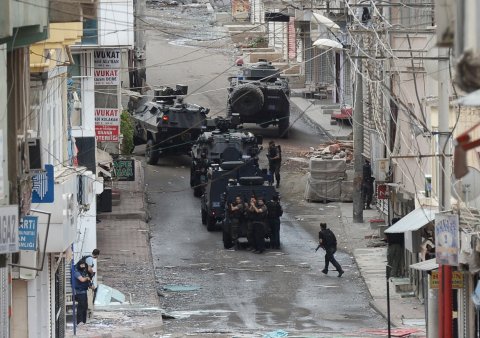
The fighters "are here to protect people against the violence of the police," says Kerem Canpolat, one of the co-mayors of Silvan and a former councilman who declared the town's "self-determination" on September 15, reeling off the previous few days' victims—five children injured by a rocket in Diyarbakir, two young men killed in an ambulance in the Diyarbakir province's Bismil district, Meygil's death in Silvan. "This is a natural self-defense. We cannot say that the PKK and the people are separate things. They are the people."
The violence springs up so easily because its roots run so deep. "Every Kurd has a painful story," says Diyarbakir shopkeeper Ihsan Seviktek, 47. His home village of Kurmiq, near Lice, was burned and bulldozed by the Turkish army in 1993. It was part of a regionwide policy of depopulating the countryside to deprive PKK guerrillas of sustenance and to give the army a clear field of fire. Some 5,000 Kurdish villages were razed, and over 2 million people displaced. "When I filed a formal complaint about the burning of my village in 2007, I was arrested and tortured in jail," says Seviktek. Most of his neighbors in the poor Suriçi area of Diyarbakir are also refugees from destroyed villages. "The state does not give us any choice but to resist."
Seviktek was arrested again in 2011 after Kurdish parties did unexpectedly well in municipal elections, and he was held for nine months without charge before being released without explanation. "They arrested us outside the law and released us outside the law too. We don't want the same to happen again. That's why we have to defend ourselves," says Seviktek, nodding toward a 5-foot-high barricade of scrap metal and cobblestones that cuts off his narrow street from the outside world. A neighboring shopkeeper produces his phone and shows off a photo of a young boy in the traditional baggy-trousered uniform of the PKK—his 15-year-old son. The PKK has a long tradition of using child soldiers in combat. "Every time I hear planes flying south, I cannot sleep because three pieces of my heart are in [the PKK stronghold of] Kandil," he says, referring to the mountainous part of northern Iraq that is home to the PKK's main base.
Prime Minister Ahmet Davutoglu insists that times have changed. "We have not gone back to the '90s. We would bring to book any illegal conduct against civilians," he said last month. "The PKK's only objective is to drag Turkey into a war between brothers." And it's true that life in the old city of Diyarbakir had been improving since the AKP came to power. The Armenian church of Surp Giragos, built in 1376 from the distinctive local black basalt stone, was abandoned in 1915 when the government expelled Diyarbakir's Armenians as suspected collaborators and marched them to exile and death in the 20th century's first genocide. But Turkey's recent prosperity, and the return of expatriate Armenians, helped get the church restored with government funds.
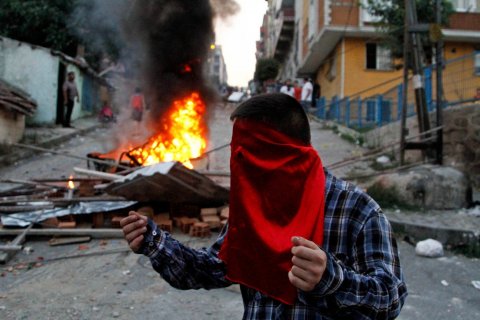
Another Armenian church, Surp Sarkis, was also restored by the Diyarbakir governorate as a carpet-weaving center designed to empower local women. But both churches have been damaged by recent fighting. In a police special operation September 12 to 13, officers smashed the new wooden doors of Surp Sarkis using an industrial-strength jackhammer and shot out the church's chandeliers and windows. A nearby baker whose storefront was hit by shrapnel swears that the church was empty, but piles of bedding inside the building and bullet holes in nearby walls suggest that someone was firing back when the security forces showed up — and it probably wasn't the lady carpet weavers.
Nearby, the Hasirli district community hall has been torched twice by soldiers since the beginning of September, says Seviktek. Locals say the building was full of civilian Syrian Kurdish refugees from Kobane—but the courtyard shows signs of a major gun battle. Turkish forces even blasted a hole in the wall of a neighboring school to get a good angle of fire for heavy-caliber machine guns that have chewed up the flimsy brickwork of surrounding buildings. The troops made a special point of firing several bullets through the forehead of every stenciled portrait of Ocalan they came across.
"There is a real war going on here," says one elderly grocer, pointing to his refrigerators full of soda that have been riddled with bullets. "Tell the world. This is worse than Gaza."
Except that—thankfully—it's not. Outside the barricades of the self-declared "independent" areas, daily life in Diyarbakir continues more or less undisturbed. Old men smoke nargile pipes in tea houses around the 1,300-year-old Great Mosque, and the grill restaurants along the high banks of the Tigris River still boast a decent number of customers. In Kayapinar, the fancy part of Diyarbakir, middle-class families picnic in the parks. Even a crowd of some 2,000 people marching through the central business district in protest of recent killings proceeds with eerie decorousness. The police don't interfere even when young men begin chanting pro-Ocalan slogans. Technically, that's "spreading terrorist propaganda" — a criminal offense that could earn them years in prison.
Nursel Aydogan, an HDP member of the parliament, addresses the orderly crowd from the top a smart, new American-style campaign bus covered in smiling photos of the party leaders. "This war is not ours, it is the palace's," she shouts, making a contemptuous reference to Erdogan. "But we will not play your games."
The problem for the HDP—and for the Kurds—is that barricading off towns unwittingly benefits the AKP. Erdogan has called for fresh elections in November in the hope that his party can regain a parliamentary majority. And while the question of whether the AKP deliberately escalated this war to discredit the HDP is in the realms of conspiracy theory, what's without doubt is that if thousands of Kurds refuse to allow ballot boxes and police officers into their neighborhoods on election day, the HDP's share of the vote could fall below the 10 percent threshold any party needs to win to have parliamentary representation. The PKK says it won't mount any operations between now and the elections, though it will defend itself if attacked. But many fear the authorities will cite security concerns as an excuse to disenfranchise thousands of Kurds.
What made the HDP's (so far) short spell in the parliament so revolutionary was not only the prospect of normalizing relations between Turkey's 60 million Turks and the country's Kurdish minority. It's also because the HDP stopped Erdogan's political juggernaut. Since 2002, Erdogan has called elections whenever he's faced a major political challenge—either from Turkey's ultra-secular military or from the judiciary that tried to stall some of the AKP's more Islamic-inspired legislation. Each time, the Turkish people gave Erdogan bigger majorities. In return, he delivered stability and prosperity, as Turkey's gross domestic product tripled in a decade and it became a respected regional powerhouse.
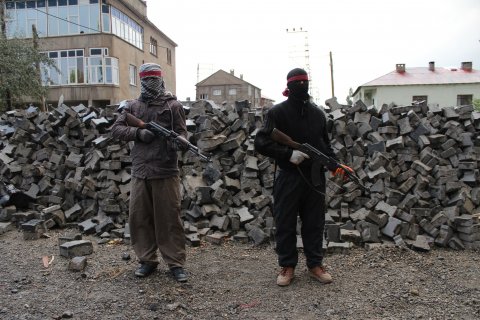
But at the same time, Erdogan has grown increasingly authoritarian. His pet project is to change the Turkish constitution to give himself more executive powers. At the same time, Turkey comes in second only to China in the number of journalists in jail. When PKK attacks killed 30 soldiers in early September, a club-wielding mob led by AKP Deputy Abdurrahim Boynukalin attacked the offices of the anti-government Hürriyet newspaper in Istanbul, threatening to kill the "traitor" journalists inside. "Fear and democracy cannot live side by side," the paper's editor-in-chief, Sedat Ergin, told critics. But when Ergin called on the government to provide security, the police assigned a prosecutor to probe the paper for "insulting the president" instead.
There are signs that Turkish public opinion is hardening against the Kurds. In the resort city of Alanya last month, protesters torched the HDP regional headquarters, while another group in Ankara tried to do the same to the party's national headquarters. Turkish television news showed angry mobs smashing the windows of buses bound for the largely Kurdish southeast. And security forces are becoming more aggressive. In early October, secretly filmed footage emerged showing a policeman beating a news cameraman, pointing his pistol at his head and threatening to shoot him if he didn't stop filming. At the same time, images emerged on Twitter of a body, identified as the brother-in-law of a HDP lawmaker, being dragged down the street by its feet behind a police van in Sirnak.
"Take a good look at this photo," HDP leader Demirtas wrote as he re-tweeted the shocking image. "We will not forget." Turkey's prime minister, Davutoglu, refused to confirm the authenticity of the photo but said, "it is unacceptable to treat any corpse this way, even if it is a dead terrorist."
Police tactics for taking back the "independent" areas have been uncompromising but apparently effective. Cizre was surrounded by a massive show of force in late September, with residents confined to their homes for eight days as police commandos went house to house hunting militants. At least 10 civilians were killed—including a month-old-baby—as well as 40 PKK members, according to the Turkish regional governor. Police launched a similar operation in Silvan on October 2—two days after Newsweek visited there—and killed 22 PKK fighters, according to police. It is not clear whether Ferman Amed, the rebel commander, was among the dead—his name is a common nom de guerre. He had told Newsweek that he was "ready to die and become a martyr, as long as it puts an end to the crime against humanity that is being perpetrated against the Kurds."
Unfortunately, for the hopes of peace, almost all Kurdish activists have experienced abuse and imprisonment, which leaves a legacy of bitterness and distrust that requires superhuman wisdom to overcome. In early October, police raided the offices that house DIHA and several other Kurdish publishing companies, newspapers and radio stations, arresting 32 people and keeping them in custody overnight. It was a familiar experience for all concerned. "There is not a single person in this building who has not been in jail," says Pekgoz, DIHA's editor, who was jailed for over two years for membership in an illegal organization. "We are used to it."
The idea that violence is the only answer runs deep. "Every single concession that we have ever won has been gained by struggle. The Turkish state has never given us a single thing voluntarily," says Salih Sezgin, who was jailed for 20 years in 1980, when he was just 16. (He now contributes to the Kurdish newspapers that share the DIHA building.) Sezgin was sentenced to death and was told repeatedly he was about to be executed. Later, he served time alongside famous PKK martyrs who burned and starved themselves to death in protest of prison conditions. Sezgin, who learned to read and write in jail, has written two books about his experiences. "What you learn in jail is that those who give up the struggle lose," he says with a beatific smile. "And those who fight on and on till the end win."
But history suggests Sezgin is exactly wrong. Every political concession the Kurds have won has come as a result of peace, cease-fires and constructive political deal-making in Ankara. But the PKK's death-cult glorification of the nobility of martyrdom and its charismatic, Che Guevara–like symbolism is proving difficult to erase. And until politicians stop using the cycle of violence to their own ends, boys like Vedat will continue to show up on street corners carrying not only their father's Kalashnikovs but their elders' endless, implacable sense of victimhood too.
Correction: This article previously incorrectly stated that Adbullah Ocalan was the sole inmate of Imrali prison. It also did not mention that the Turkish government provided supplies to Kobane and allowed the passage of Kurdish fighters.



